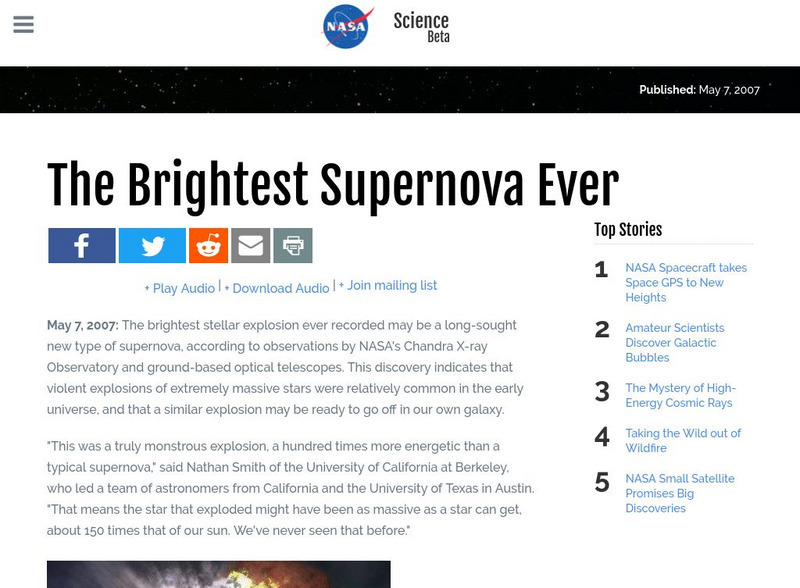Curated OER
Chandra X-Ray Observatory
Students tour Chandra's top galactic X-ray images. In this Chandra X-Ray Observatory lesson, students play games and complete puzzles based on the Chandra Mission and X-Ray Astronomy. Students listen to pod casts, question an...
Curated OER
The Hand of Chandra!
For this nebula worksheet, high schoolers read about the Chandra X-ray Observatory that captured the given image of a pulsar and its nebula. Students solve 3 problems including using similar triangles and proportions to find the image...
Curated OER
Chandra Studies and Expanding Supernova Shell
In this supernova learning exercise, students read about the expanding supernova shell that was discovered by the Chandra X-ray Observatory. Students solve two problems including finding the scale of the given images and determining the...
Curated OER
Chandra Spies the Longest Sound Wave in the Universe!
In this black hole worksheet, students use an x-ray image and a sound waves image to determine the size and the wavelength of the sound wave. This worksheet has 3 problems to solve.
Curated OER
Seeing The Sun In A New Light
Students examine the observation of "coronal holes," by x-rays, also about related fast streams and moderate magnetic storms that recur at 27 day intervals. They study NASA'S great observatories.
NASA
Taking a Cold, Clear Look at the Universe
Take a look with another perspective. Pupils read to find out what portion of the electromagnetic spectrum a space telescope sees and the difficulties of viewing infrared radiation from other objects in space. Individuals discover how...
Curated OER
Black Holes IV
In this black holes activity, students read about black holes and solve 3 problems where they calculate the Schwarschild radius of one, the number of grams/second a quasar luminosity implies for another and the number of suns per year a...
Harvard University
Smithsonian Astrophysical: Chandra X Ray Observatory
Chandra X-Ray Observatory is an space observatory designed to detect x-rays. The public web site gives information about Chandra and X-ray astronomy in general (in field guide). It also gives educational materials for teachers.
Harvard University
Harvard Univ.: Chandra X Ray Observatory Center
The Chandra Observatory uses x-ray telescopes to learn more about the make-up of the universe. To learn more about x-ray telescopes and to see what they reveal, click here for the official Chandra X-ray Observatory website.
NASA
Nasa Star Child: Chandra X Ray Observatory (Level 2)
A description of the missions of Chandra. There is also an audio song. Glossary, graphics and printable version of page included.
Harvard University
Chandra X Ray Observatory: Video Podcasts: The Incredible Two Inch Universe
A set of podcasts outlining a four-step process for understanding the vastness of our universe, from the vicinity of the Earth and Moon, out into distant galaxies. Downloadable instructions and a handout are included, as well as...
Harvard University
Chandra X Ray Observatory Center: X Ray Pulsar
X-ray pulsars are explained. Features a Java applet that simulates a pulsar and allows the viewer to control the rotational speed.
NASA
Nasa Science: The Brightest Supernova Ever Seen
Article explores the supernova of a star that is possibly "150 times more massive than our Sun." The primary observations of the explosion were accomplished through the Chandra X-ray Observatory. (May 7, 2007)
Harvard University
Chandra Special Features
Chandra allows astronomers to view our galaxy and beyond in ways only dreamt of before. 14 interactive features are offered in this exciting look at cosmic phenomena.
Harvard University
Harvard Smithsonian Center for Astrophysics: The Constellations
Based on images from the Chandra X-Ray Observatory, this is an excellent glossary of all the constellations, including the ones that make up the Zodiac. Find images, photographs, and an excellent background narratives concerning each...
NASA
Nasa: Marshall Space Flight Center: Chandra
NASA's Chandra X-ray Observatory site features a photograph and explanation of a "cool" black hole in the Andromeda Galaxy (M31).











